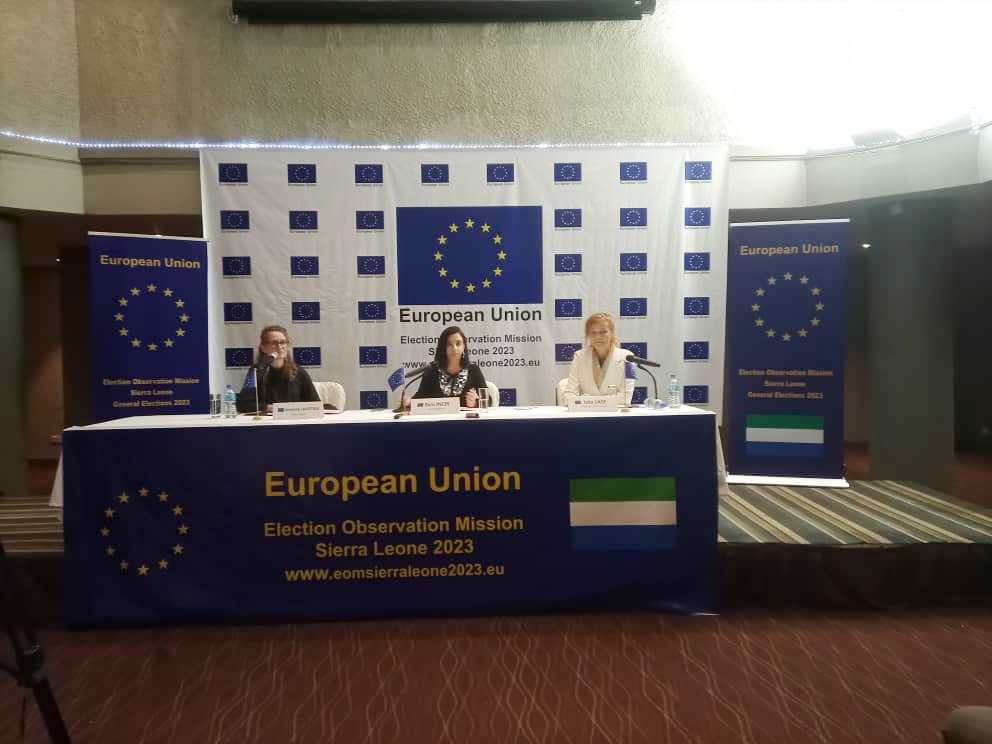BY Allieu S. Tunkara
In response to an invitation by ECSL (Electoral Observer Mission To Sierra Leone), EU has deployed an EU Election Observation Mission (EU EOM) for the general elections scheduled for 24th June, 2023.
The Mission’s mandate is to observe all aspects of the electoral processes and assess the extent to which the elections comply with Sierra Leone’s laws as well as with regional and international standards and commitments Sierra Leone has made regarding democratic elections.
The mission will look at the legal framework and its implementation, work of the election administration, campaign activities, role of state institutions and civil society and the conduct of the media among others.
The EU EOM, led by Chief Observer, Ms Evin Incir, Member of the European Parliament started its activities in Freetown on 11 May with the arrival of a core team of 10 election experts.
“I am honoured to lead the EU Election Observer Mission to Sierra Leone, a country that has an important role to play in the West Africa region as well as on a global scale. We, as a mission, have the mandate to observe the election process, and we will conduct our observation in a strictly impartial manner,” said Chief Observer, Ms Evin Incir at the opening press conference in Freetown.
This week, the EU will deploy 28 long-term observers to cover all 16 districts of Sierra Leone. They will observe election preparations, the election campaign and the activities of electoral stakeholders. Closer to election day, 40 short-term observers will join the EU EOM to observe the voting, counting and tabulation of the results.
A delegation of members of European Parliament and approximately 10 locally recruited short-term observers from the diplomatic missions of EU member states accredited to Sierra Leone will also join the EU EOM to observe the election day proceedings.
At full length, the EU EOM will comprise some 100 observers drawn from 26 EU member states, Canada and Norway.
“Our aim in Sierra Leone is to support democratic consolidation. However, it is a joint responsibility of all political parties, candidates, civil society organisations, media and the electoral administration to maintain a peaceful pre-election environment in which fundamental rights and freedoms of all Sierra Leoneans are respected,” Chief Observer, Evin Incir told journalists during the press conference.
The Chief Observer also made it clear that the EU team would stay on the ground for emerging electoral issues. She went on to state that the EU EOM will issue a preliminary statement, and hold a press conference in Freetown two days after the election.
The mission will remain in Sierra Leone until the completion of the electoral process in case of a second round of the presidential election. The mission will also follow any potential complaints and appeals process, and a final report, offering recommendations for future electoral processes will be presented thereafter. The Chief Observer also assured Sierra Leoneans that the team will be neutral in its observatory functions.
“The EU is bound by a code of conduct which requires strict neutrality and non-interference. It undertakes its work in accordance with the Declaration of principles for International Election Observation endorsed under UN Auspices in 2005,” Chief Observer assured Sierra Leoneans particularly election stakeholders.
EU began observation of general elections in Sierra Leone in 1996 to ensure a fair, peaceful and credible electoral process.
The EU Mission also observed the 2002, 2007, 2012 and 2018 elections in Sierra Leone, and will also do the same in June 24, 2023.
The EU has an established methodology for observing elections, and observers do not interfere in the electoral process and, have no authority to change or correct any shortcomings. All EU election observers are bound by a strict code of conduct and ethical guidelines that guarantee their neutrality and impartiality.
The main objectives of the EU Election Observer Mission are to support the democratic process in partner countries, enhance public confidence in the electoral process and to strengthen respect for human rights and rule of law.


